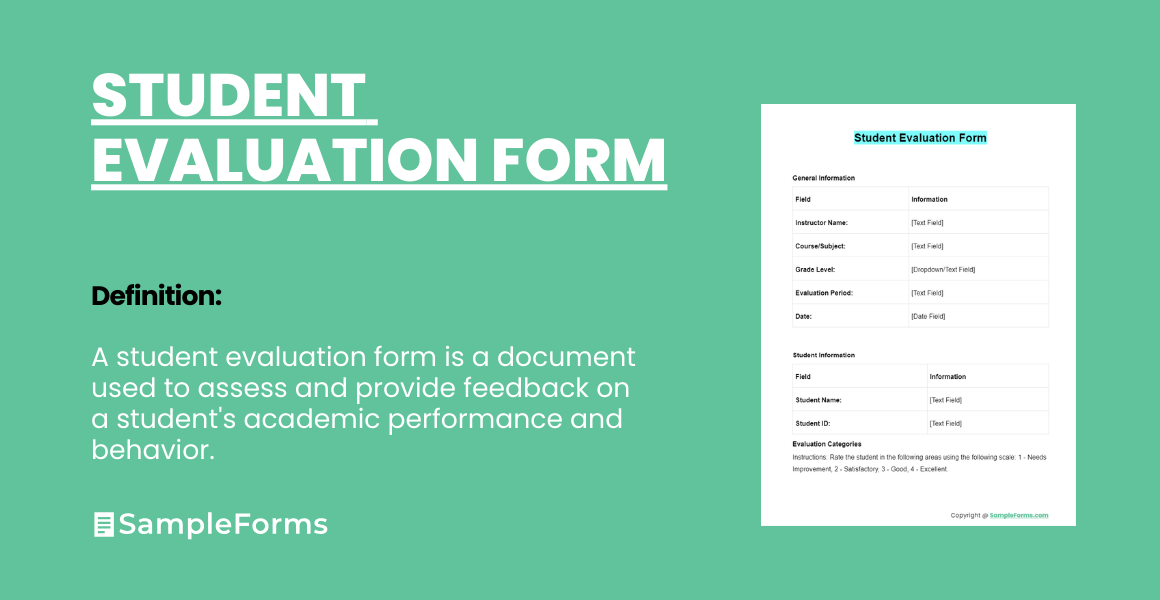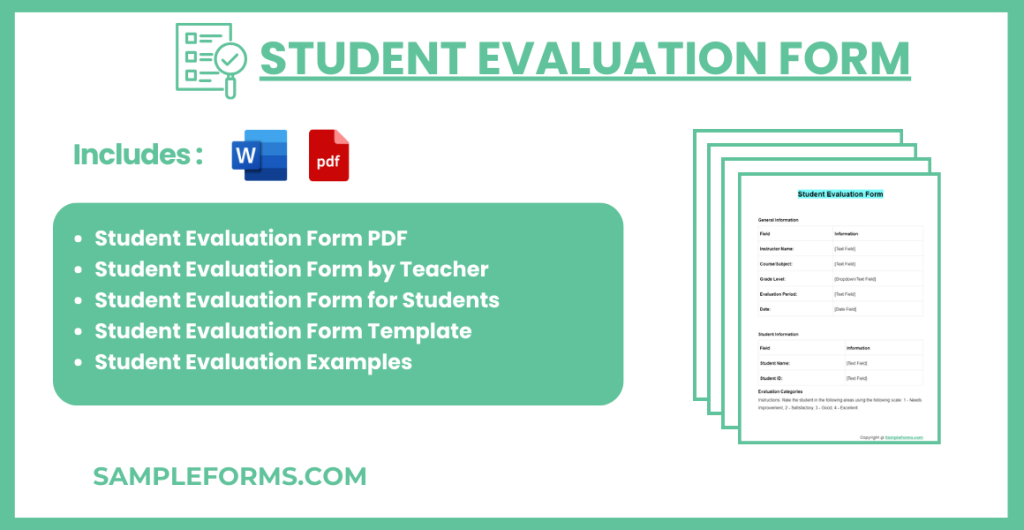Embarking on the journey of student assessments? Dive into our detailed guide on Student Evaluation Forms, designed to simplify the evaluation process for educators and students alike. With actionable examples and insightful tips, we unlock the potential of effective assessments. Learn how to craft, utilize, and benefit from Evaluation Form and Self Evaluation Form, enhancing the educational experience with precision and ease. This is your first step towards mastering student evaluations.
Download Student Evaluation Form Bundle
What is a Student Evaluation Form?
A Student Evaluation Form is a structured tool used by educators to assess, track, and improve students’ academic performance, behavior, and skills. These forms serve as a critical feedback mechanism, enabling teachers to provide constructive evaluations tailored to each student’s learning journey. By systematically documenting progress and areas needing attention, Student Evaluation Forms foster a supportive learning environment that encourages growth and achievement. Simple yet powerful, these forms are essential in the educational toolkit for enhancing student outcomes.
What is the Best Sample Student Evaluation Form?
A comprehensive Sample Student Evaluation Form might include the following sections to effectively assess a student’s performance and progress:
Student Evaluation Form
Student Information
- Student Name: [__________]
- Grade/Class: [__________]
- School Year: [__________]
- Teacher: [__________]
Academic Performance
- Subject Knowledge:
- Excellent
- Good
- Average
- Below Average
- Homework Completion:
- Always
- Often
- Sometimes
- Rarely
- Class Participation:
- Highly Active
- Participative
- Infrequent
- Non-Participative
Behavioral Assessment
- Peer Interaction:
- Very Positive
- Generally Positive
- Occasionally Challenging
- Often Difficult
- Adherence to Rules:
- Always
- Mostly
- Occasionally
- Seldom
- Responsibility:
- Highly Responsible
- Generally Responsible
- Occasionally Irresponsible
- Often Irresponsible
Skill Development
- Critical Thinking:
- Excellent
- Good
- Developing
- Needs Improvement
- Communication Skills:
- Excellent
- Good
- Developing
- Needs Improvement
- Teamwork:
- Excellent
- Good
- Developing
- Needs Improvement
Additional Comments
- Teacher’s Remarks: [____________________________________]
- Suggestions for Improvement: [___________________________]
- Parent/Guardian Feedback: [______________________________]
Signatures
- Teacher’s Signature: [______] Date: []
- Parent/Guardian’s Signature: [______] Date: []
Student Evaluation Form Format
Instructor Information
- Instructor Name:
- Course/Subject:
- Grade Level:
- Evaluation Period:
- Date:
Student Information
- Student Name:
- Student ID:
Evaluation Criteria
- Understanding of Subject Material: [Rating Scale]
- Participation and Engagement: [Rating Scale]
- Homework and Assignments Completion: [Rating Scale]
- Behavior and Cooperation: [Rating Scale]
- Additional Comments:
Student Evaluation Form PDF, Word and Google Docs
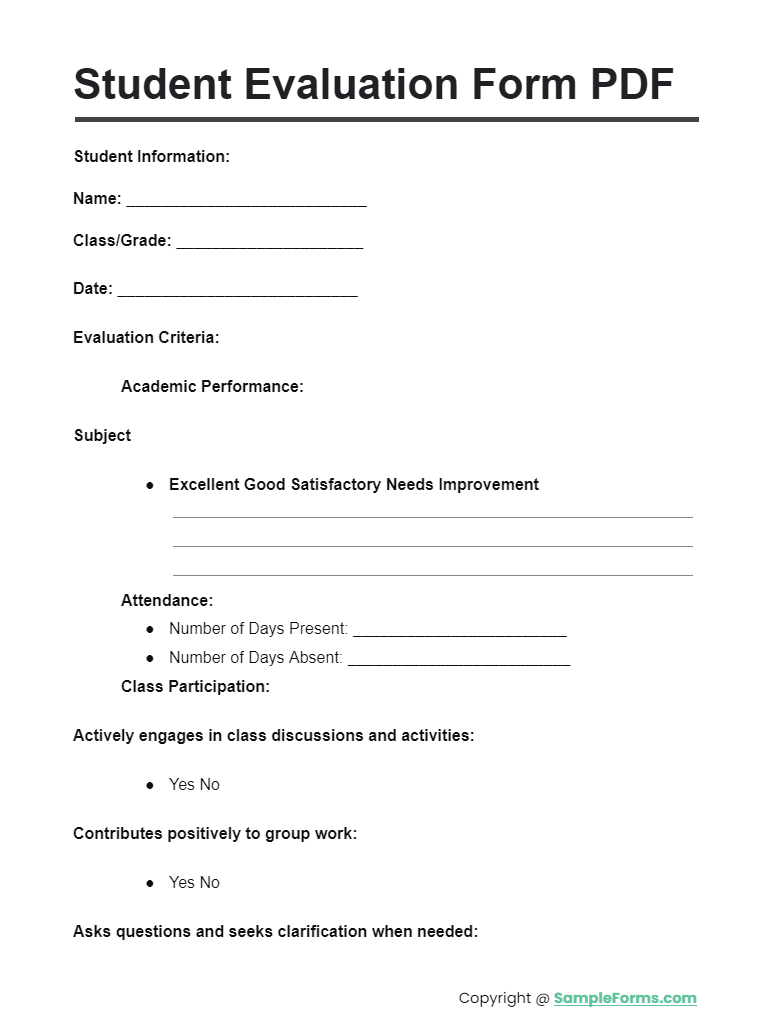
Unlock the power of comprehensive assessment with our Student Evaluation Form PDF, seamlessly integrating Training Evaluation Form and Employee Evaluation Form elements. This guide ensures educators and administrators have the essential tools for thorough and effective student evaluations.
Student Evaluation Form by Teacher
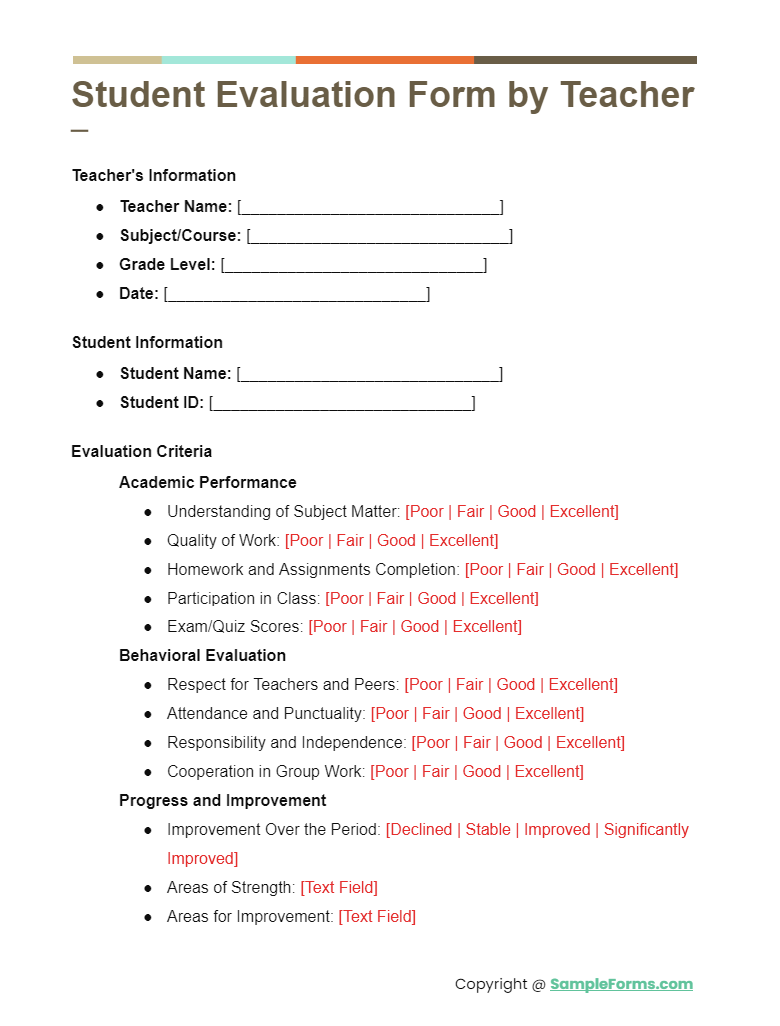
Our guide to the Student Evaluation Form by Teacher incorporates critical aspects of Peer Evaluation Form and Employee Self Evaluation Form, providing educators a holistic tool for assessing student performance while fostering self-awareness and peer feedback.
Student Evaluation Form for Students
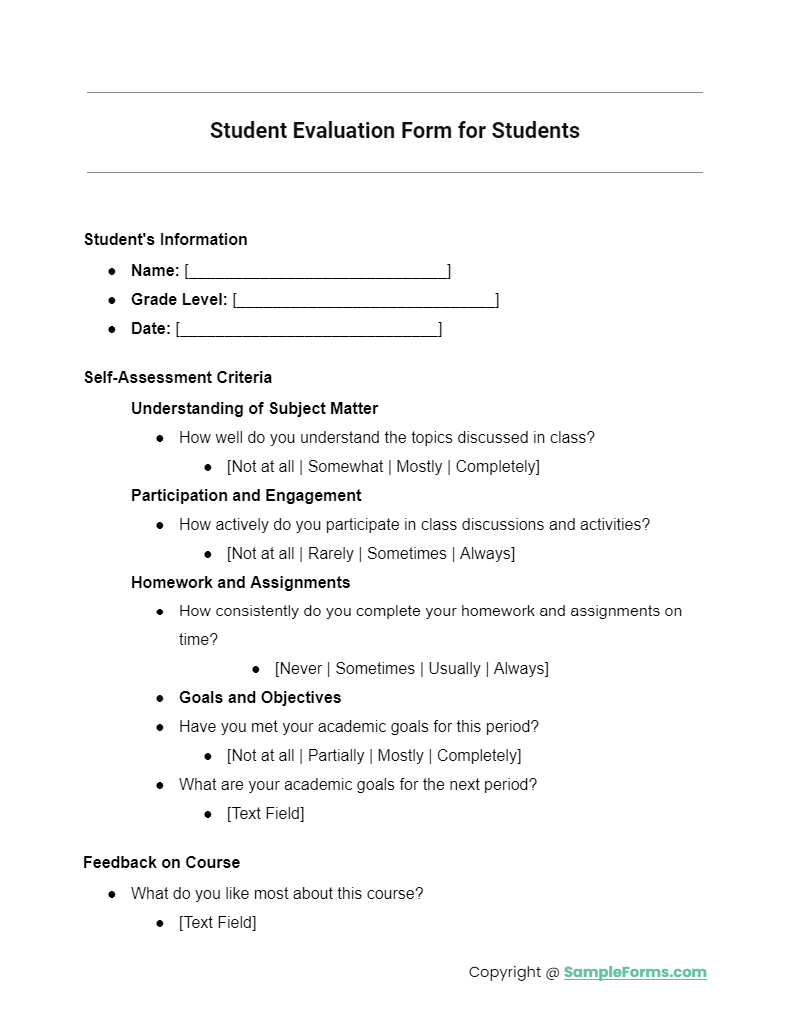
Explore our Student Evaluation Form for Students, designed to echo the structure of Employee Performance Evaluation Form and Call Monitoring Evaluation Form. This resource empowers students to engage in self-assessment, enhancing their understanding of personal achievements and areas for growth.
Student Evaluation Form Template
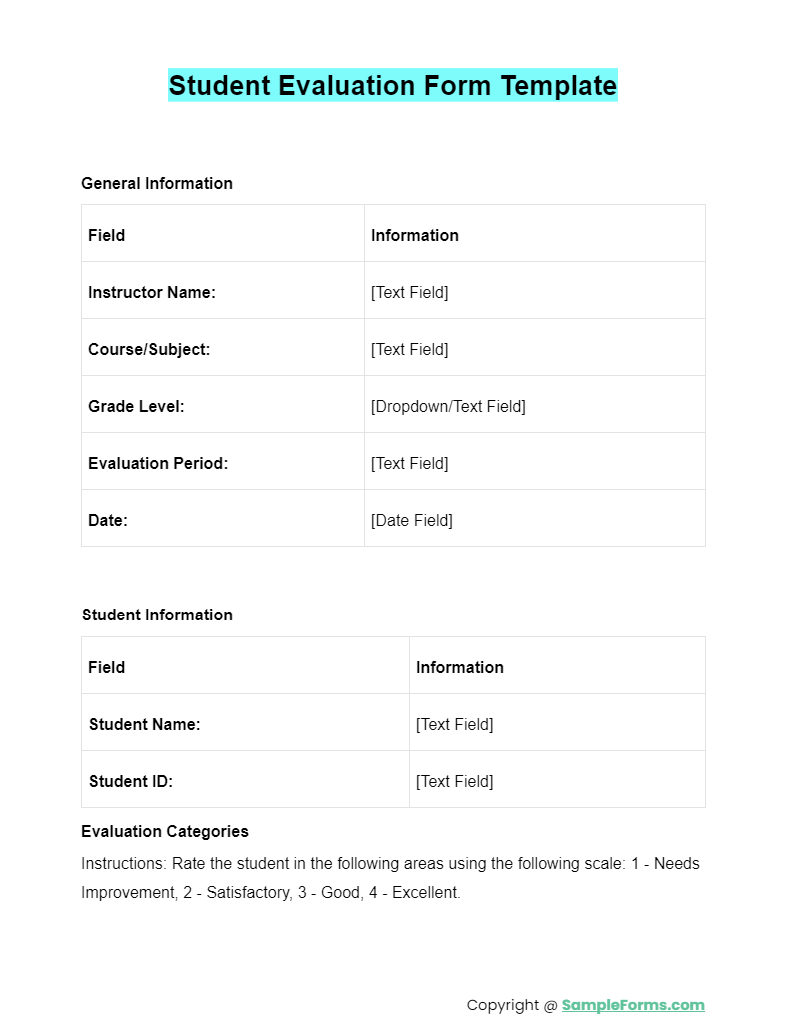
The Student Evaluation Form Template is an indispensable tool, blending elements from the Interview Evaluation Form and Speech Evaluation Form. It offers a versatile framework for educators to customize assessments across various contexts and subjects.
Student Evaluation Examples
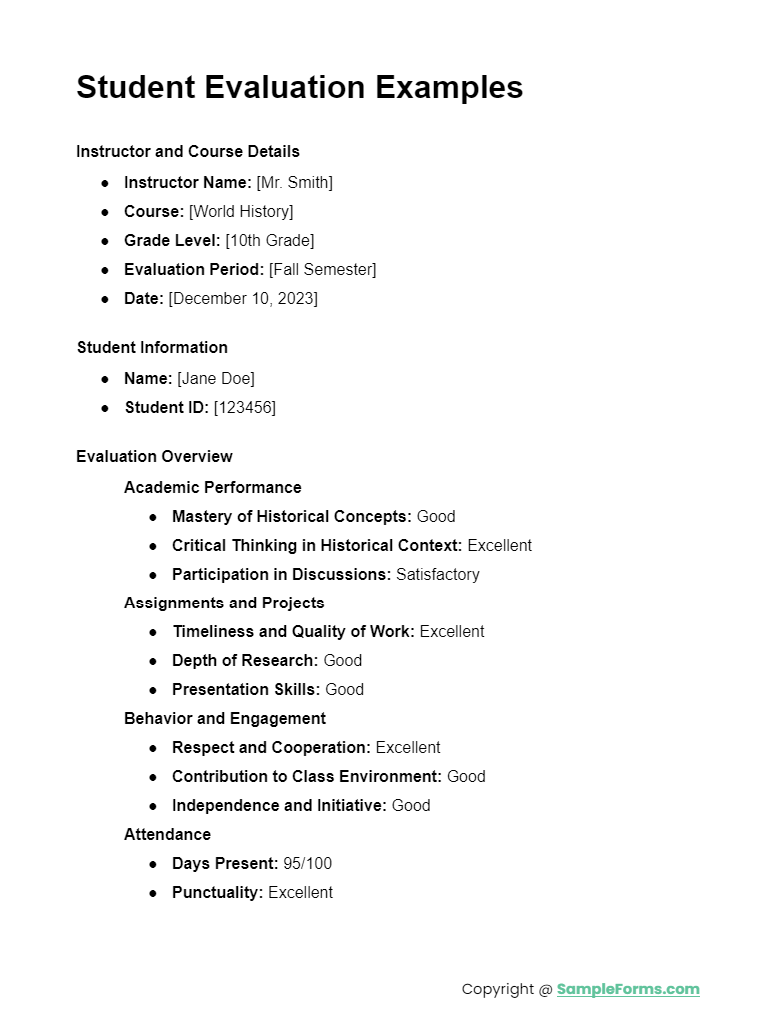
More Student Evaluation Form Samples
Free Student Evaluation Form
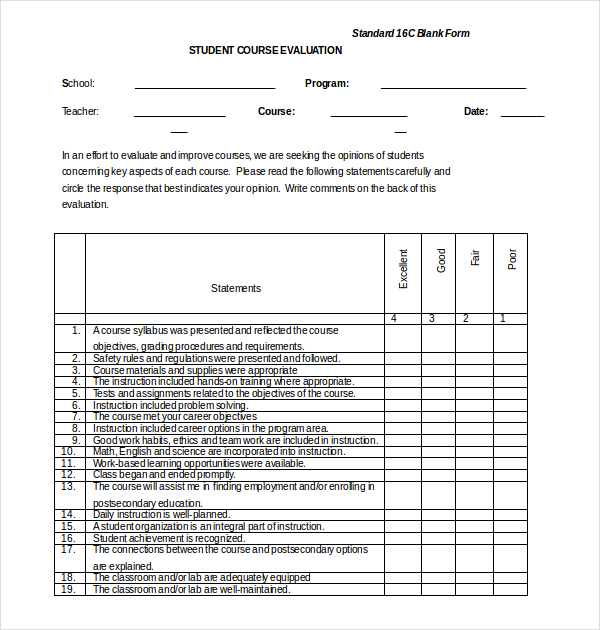
education.ky.gov
Students who are in an academic set-up are required to fill this form for a better education system. The form is for assessing the faculty, punctuality of classes, course material, safety rules, classroom equipment, individual student help, student given time to ask questions etc. These forms are to be filled by students only. These forms are private and confidential.
Student Presentation Evaluation Form in PDF
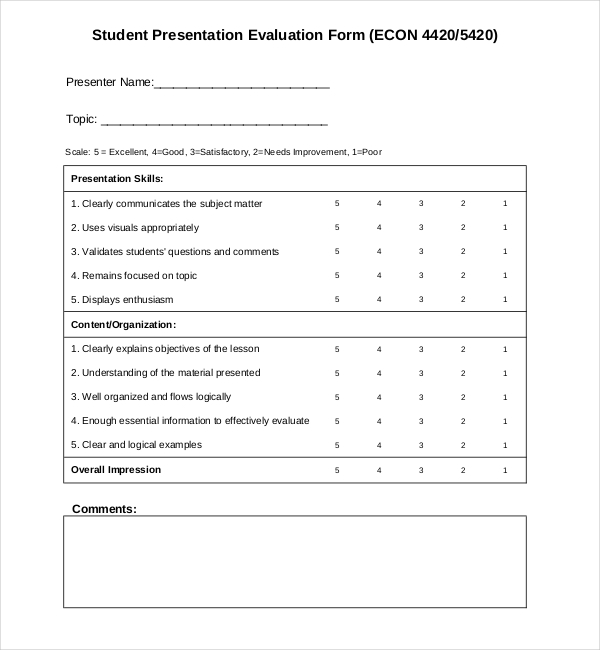
chem.unt.edu
Many students have to attend seminars for academic purposes. These forms are for assessing these presentations. The forms are to be filled by students based on how they felt about the overall presentations. They are free to fill negative points here since it is a feedback for them. Constructive criticism is welcomed.
Student Peer Evaluation Sheet Form
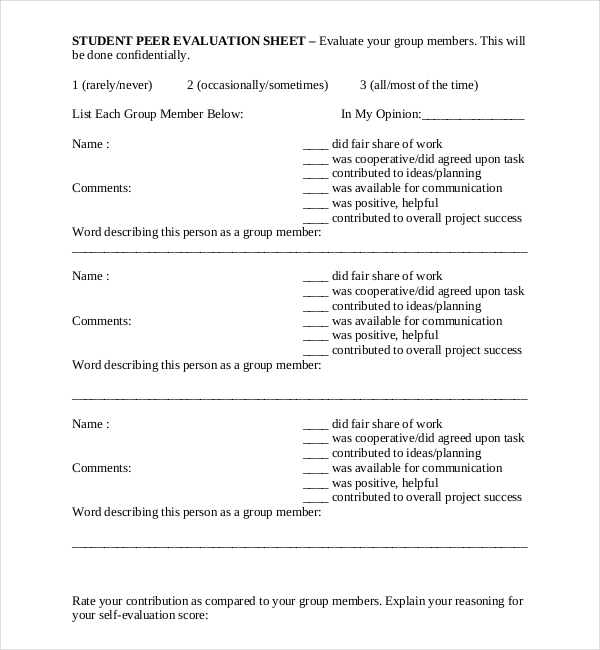
chnm.gmu.edu
Often students have to deal with their peer group. In this case, they have to assess their peer group. In this form, the student has to evaluate their peer members so that the institution knows about their individuals when they are in a group. The peer group is evaluated upon their share of work, cooperativeness, contribution, communication, project success. The names and comments are required for further understanding.
Student Evaluation Form for Teachers
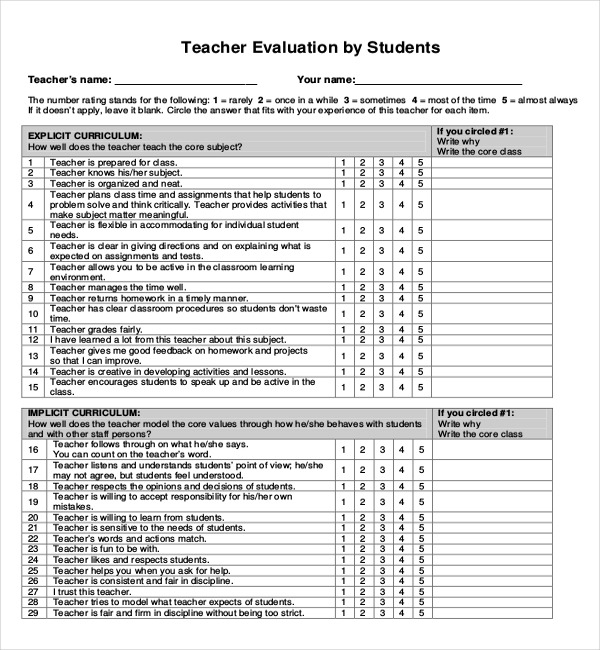
rucharacter.org
The tasks of teacher are to observe a student and try help them in every way possible. But sometimes it is confusing on how to evaluate them. It is at this time when this form comes handy. The teachers will be able to assess their students with ease by covering all the aspects through the form. Useful Teacher Evaluation Forms
Ballet Student Evaluation Form
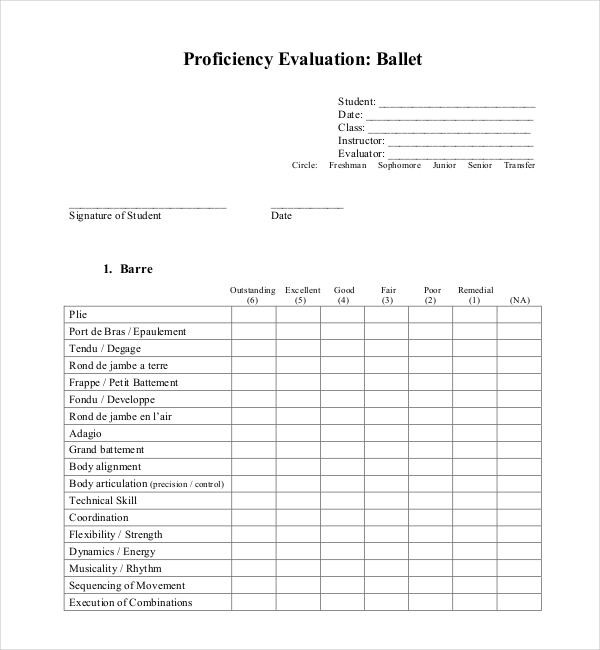
winthrop.edu
Ballet is an artistic form of dance form originating from Italy. The students who learn ballet are evaluated by their evaluator in various aspects of the dance. The students are analyzed on Barre, Center and Participation skills. A comment section is provided for additional information.
College Student Evaluation Form
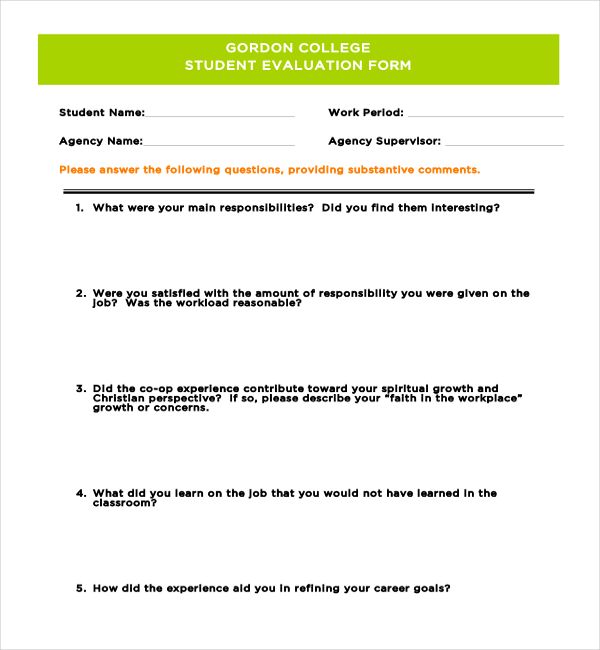
gordon.edu
The forms help in determining the true scenario of a college and their students. This form by Gordon College needs to be filled up by students based on their college experience. Any suggestion regarding the improvement of the college is appreciated. This form may be used in the literature marketing in the cooperative education program.
Dance Student Evaluation Form
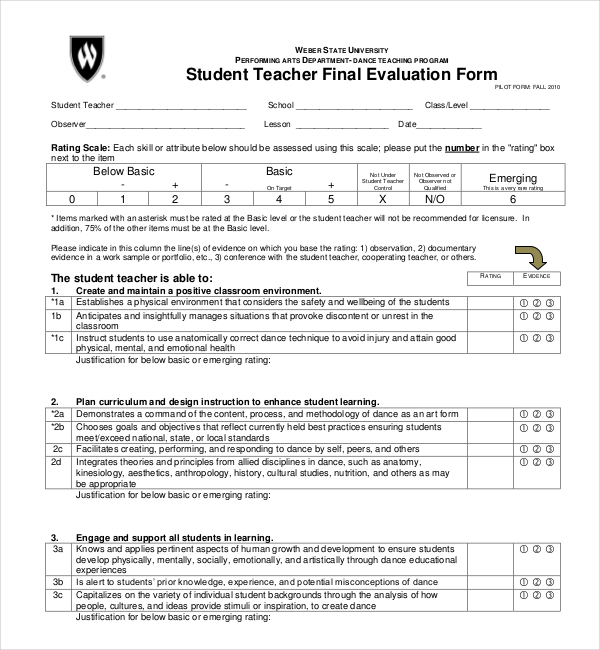
weber.edu
This dance evaluation forms are for students who are seeking to learn dance from Weber State University. The form is to assess a student in terms of their dancing abilities and learning capabilities. The forms are duly signed and submitted by the observer. There should not be any qualms in writing down extra remarks.
Elementary Student Evaluation Form
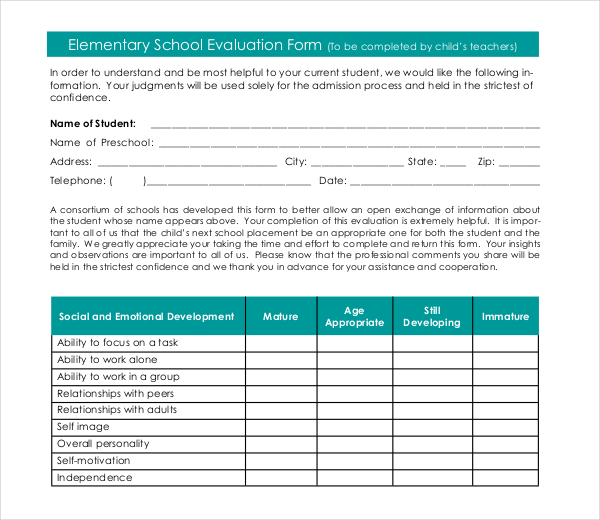
tiohdayschool.org
For little kids who have just entered the educational set up would require extra care. This means the school requires elementary student evaluation form. This form focuses on the all-round development of the student so that further help is given to them if required. The relationship of student with peers, adults, group, alone etc. are looked upon by the observer/evaluator.
Graduate Student Evaluation Form
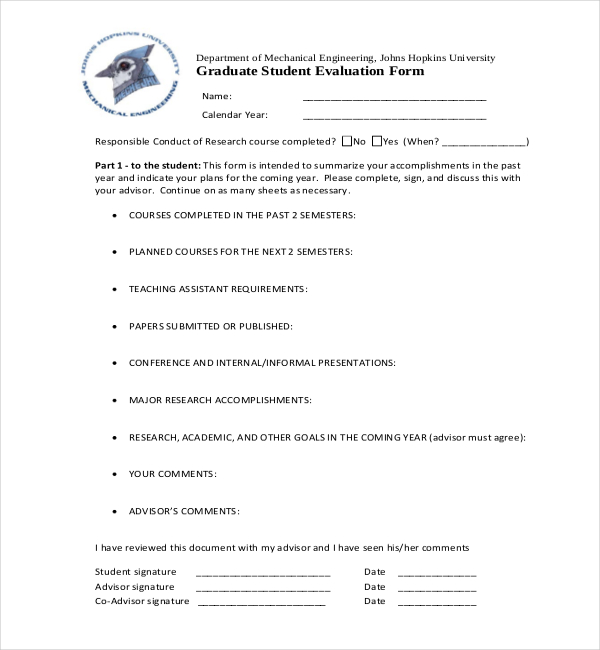
me.jhu.edu
Johns Hopkins University presents the graduate evaluation form that is made to assess students in a college set up about their plans in future. The plans for the coming year are asked to the students. These forms will help the college to analyze the students’ needs and accordingly design courses in future.
High school Student Evaluation Form
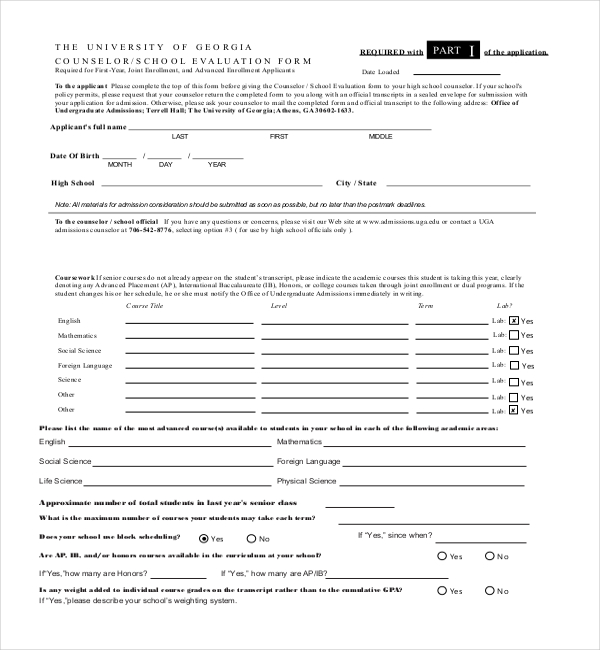
admissions.uga.edu
The students who are going to enter high school or are in their high school years need to be assessed by the counselors. They are noted for their skills and weaknesses. An additional space is given for the teachers to ask about the students.
Internship Student Evaluation Form
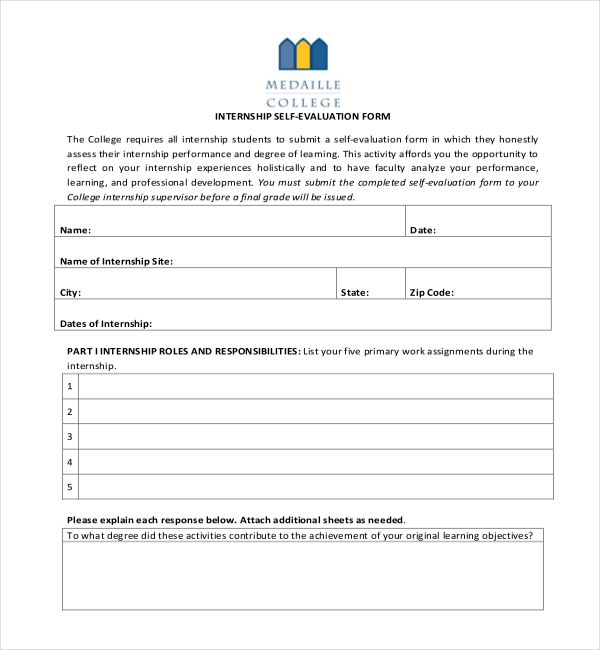
medaille.edu
Students who take part in internships have to fill up this form at the end of the internship period so that the responsibilities are judged by the college. The self-evaluation forms as about the student’s experience while undergoing the internship. This form is submitted to the Office of Academic Affairs.
Kindergarten Student Evaluation Form
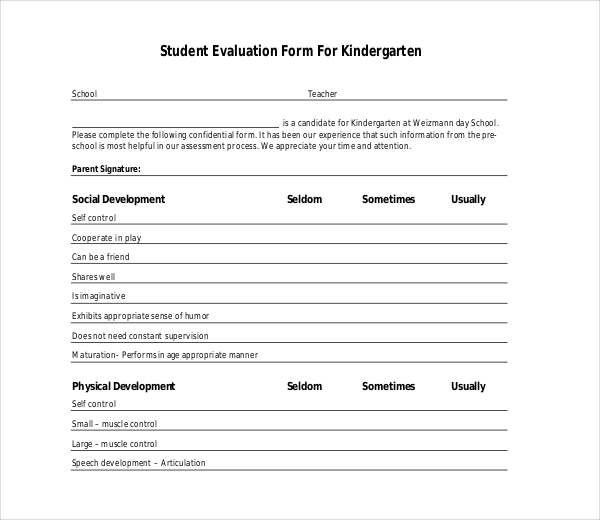
weizmann.net
Kindergarten students are always needed to be taken care of. Their development physically, socially, mentally is observed by the evaluator through this unique form. The skills are noted, and the forms are submitted duly to the respective school. The forms are for student assessment purposes for the schools.
Medical Student Performance Evaluation Form
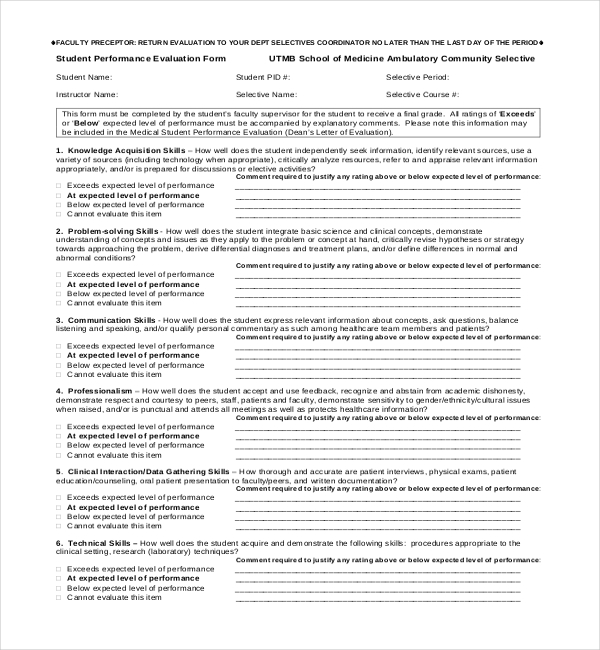
utmb.edu
To receive a final grade by the supervisor of the medical school, they must fill up this form. This evaluation form may be included in the dean’s evaluation letter. Skills like problem solving, communication, professionalism, technical skills, written assignments, knowledge are assessed.
Nursing Student Evaluation Form
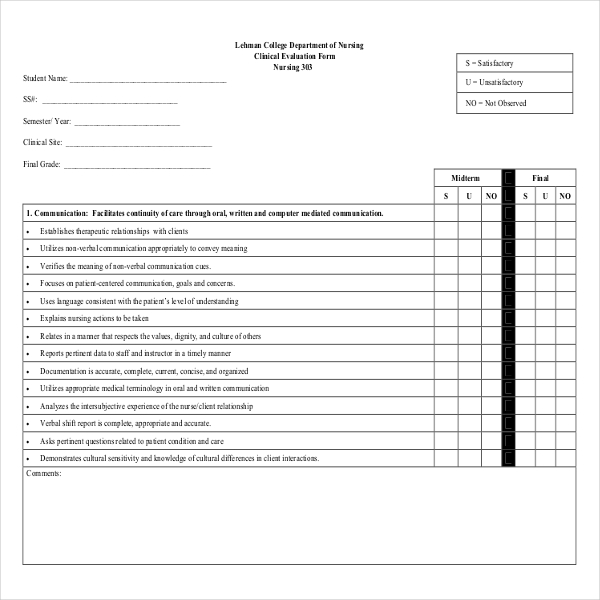
lehman.edu
This form is for the evaluator to assess the work of the nurse in a clinical set-up. The nurse is evaluated in terms of communication skills, services provided, nurse and doctor relationship, nurse and client relationship etc. The form is submitted in time so that necessary gradations or actions are applied.
Paramedic Student Evaluation Report Form
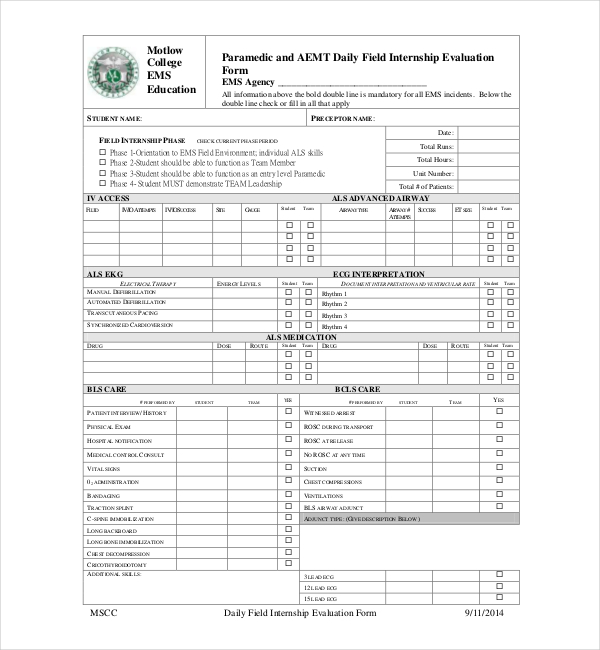
mscc.edu
Paramedic internship is an important part of hospital training. The students are evaluated in the paramedic internship in terms of their communication skills, aptitude, team leadership, medication, report interpretations, BLS care, IV access etc. This sample form is by Motlow College EMS Education. The forms have mentioned the four phases on which the students will be evaluated.
Summer Student Evaluation Form Examples
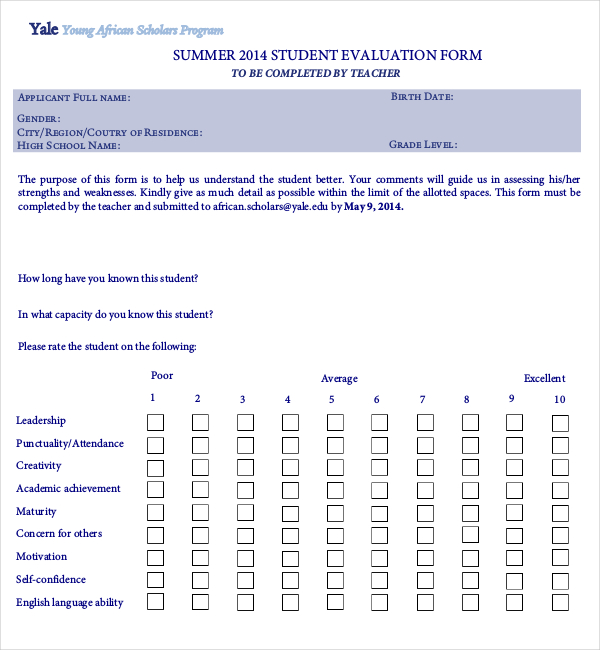
globalscholars.yale.edu
A teacher fills up the summer student evaluation forms for understanding the student better. The teacher’s comments will help the program supervisor in knowing the strength and weakness of the student better. The teachers are asked about their student’s leadership skills, creativity, maturity, motivation, empathy, language ability, self-confidence etc.
Student Evaluation of Teaching Form
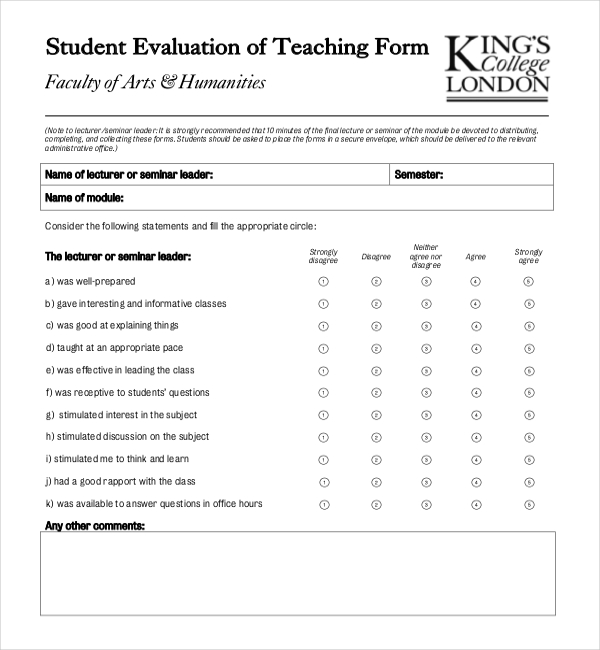
kcl.ac.uk
The students are asked to fill-up this form at the end of the lecture or seminar. This form enquires about the lecturer in a few questions. It is a simple form that needs to be filled up in just few minutes. These forms are then reviewed by the head of the teaching department for a discussion if the lecturer is appropriate or not.
Standard Student Appraisal Evaluation Form
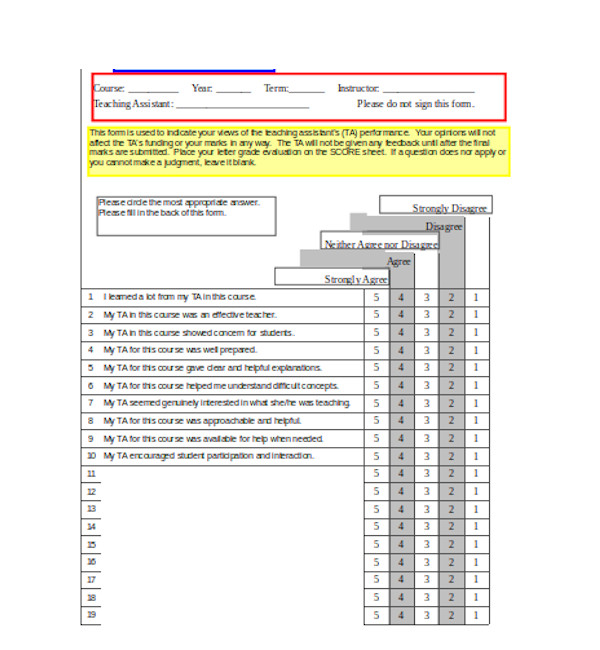
skhs.queensu.ca
What is the Purpose of Student Evaluation Form?
The purpose of Student Evaluation Forms is to systematically assess and document students’ academic performance, engagement, and progress in various activities. Incorporating an Activity Evaluation Form, these tools help educators identify strengths, areas for improvement, and the effectiveness of instructional strategies, ensuring a tailored approach to enhancing the educational experience and promoting student success. You can also use Proposal Evaluation Form
10 Uses of Student Evaluation Form
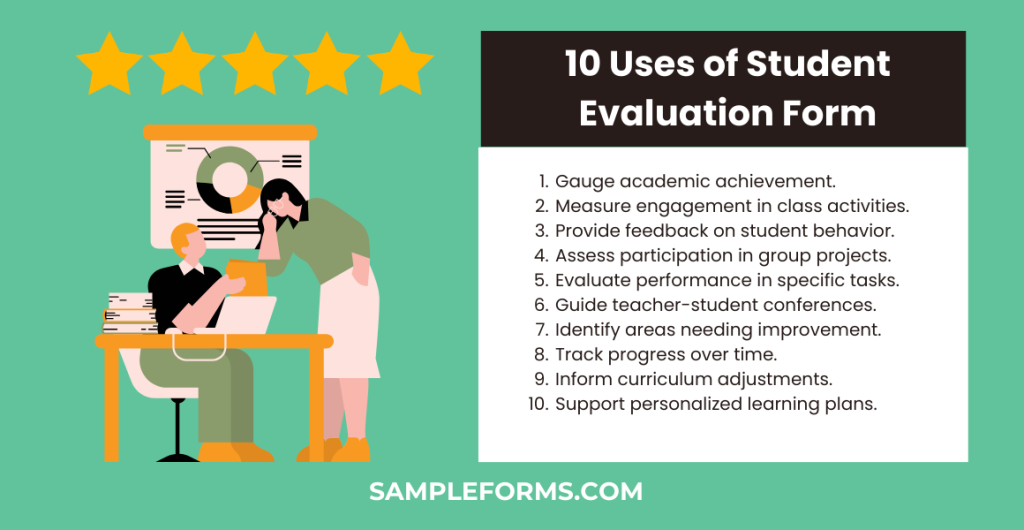
- Gauge academic achievement.
- Measure engagement in class activities.
- Provide feedback on student behavior.
- Assess participation in group projects.
- Evaluate performance in specific tasks.
- Guide teacher-student conferences.
- Identify areas needing improvement.
- Track progress over time.
- Inform curriculum adjustments.
- Support personalized learning plans.
Facts About Student Evaluation Forms
- First and foremost, one should know that these forms are strictly confidential from other fellow students.
- These forms require student details so as to know the student demographic. It is also used for any such instance where the student can be called by a faculty for personal questioning only.
- One can comment in the form at free will. There must not be any doubts in writing down queries or honest opinions. This will only help things get better.
- These evaluations can be done by process of personal observation, reviewed information already gathered, interviewing parent, teacher, students or questionnaire and surveys. Here, we focused on the last one, that is, questionnaire and survey.
- Ensure that all the fields are filled up honestly and not be treated without seriousness. Some people do so, and it only gives misinterpretation about either the student or the faculty and education system. You also browse our Seminar Evaluation Form.
Online Availability of the Student Evaluation Forms
If you are wondering how to get these sample form templates, your worries must end immediately. These sample forms are easily available in our website. They can be downloaded and printed for your convenience. These evaluation forms are well tailored and can be edited accordingly. You can get these forms in both PDF and Word formats as well! The forms are designed in such a way that they have a guaranteed high success rate. The compatibility of the forms is available in both higher and lower versions. If you still require extra customization, you can inform us. We will gladly help you. Thus, you are just one click away to get hold of these important Customer Service Evaluation Form.
Steps for writing a Student Evaluation?
Writing a student evaluation involves a thoughtful and systematic assessment of the student’s performance, behavior, and overall progress. Here’s a step-by-step guide:
- Gather Information: Review the student’s work, including assignments, tests, projects, and any other relevant materials. Consider their participation in class discussions, group work, and other interactive aspects of the course.
- Consider the Whole Student: Look beyond academic performance. Consider the student’s behavior, social interactions, and any extracurricular activities they are involved in.
- Use a Structured Format: Follow a structured format like the Sample Student Evaluation Form. This ensures you cover all necessary areas, such as academic performance, class participation, behavior, and interpersonal skills.
- Be Specific and Objective: Provide specific examples to support your assessments. For instance, rather than saying “good in math,” mention a particular area or concept the student excels in, like “shows strong skills in algebra.”
- Highlight Strengths and Areas for Improvement: Identify the student’s strengths and areas where they can improve. Be constructive and provide suggestions for improvement.
- Include Self-Assessment: If possible, include the student’s self-assessment. This can provide insight into how the student perceives their own strengths and challenges.
- Write Clearly and Concisely: Use clear, concise language. Avoid educational jargon if the evaluation will be shared with parents who might not be familiar with it.
- Be Honest but Tactful: Provide honest feedback in a respectful and tactful manner. The goal is to encourage and guide the student, not to demoralize them. Our Candidate Evaluation Form is also worth a look at
- Summarize and Provide Recommendations: Conclude with a summary of the student’s overall performance and provide recommendations for future growth, such as focusing on certain subjects, participating more in class, or engaging in specific extracurricular activities.
- Review and Reflect: Before finalizing the evaluation, review it to ensure it’s fair, balanced, and reflective of the student’s performance over the entire evaluation period.
Remember, the purpose of a student evaluation is not only to assess past performance but also to guide future development and improvement. You should also take a look at our Sales Evaluation Form and Trainee Evaluation Form
How do you Write a Good Evaluation for a Student?
Incorporate feedback from a Workshop Evaluation Form, focusing on specific achievements and areas for improvement. Use clear, constructive language to guide and motivate the student.
How do you Evaluate Students Performance Examples?
Utilize a Mentor Evaluation Form to provide real-world examples of student successes and challenges. Tailor feedback to individual learning experiences, highlighting progress and potential.
What is Student Appraisal Form?
A Student Appraisal Form, akin to a Teacher Evaluation Form, assesses students’ academic progress, behavioral attitudes, and skill development, providing a comprehensive review of their performance.
How do you write a Positive Evaluation?
Drawing from a Course Evaluation Form, emphasize strengths and accomplishments. Offer constructive feedback in a supportive manner to encourage growth and continuous learning.
How do Teachers Evaluate Students Performance?
Teachers use tools like the Nurse Evaluation Form to assess students’ knowledge, skills, and attitudes. Evaluations are based on observations, tests, assignments, and class participation.
Related Posts
-
FREE 6+ Business Credit Checklist Forms in PDF
-
Employee Pay Increase Form
-
Chef Evaluation Form
-
FREE 8+ Kitchen Evaluation Forms in PDF | MS Word
-
Customer Service Evaluation Form
-
FREE 15+ Grant Evaluation Forms in PDF | MS Word
-
FREE 14+ Volunteer Evaluation Forms in PDF
-
Mentee Evaluation Form
-
Speaker Evaluation Form
-
FREE 14+ Vehicle Evaluation Forms in PDF
-
FREE 14+ Trainee Evaluation Forms in MS Word | PDF
-
Resume Evaluation Form
-
FREE 14+ Retreat Evaluation Forms in PDF
-
Debate Evaluation Form
-
FREE 14+ Book Evaluation Forms in PDF | MS Word
